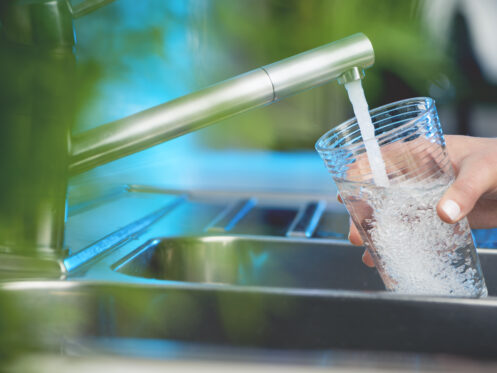Have you noticed spots on your glassware or found it tough to get a good lather from your soap?
Chances are, hard water is to blame. This type of water is packed with minerals like calcium and magnesium that can interfere with everyday tasks—from cleaning to washing clothes—and even affect your plumbing over time. At BP Plumbing in Chattanooga, TN, we’re familiar with these issues and ready to help you get to the root of your water concerns.
What Makes Water Hard?
To understand hard water, it helps to know what’s actually in your tap. As water travels through the ground, it picks up minerals—mainly calcium and magnesium—from rocks and soil. These minerals aren’t dangerous to your health, but they can cause plenty of headaches around the house. If your water comes from a well, the chances of having hard water are even higher.
When water flows through materials like limestone, gypsum, or chalk, it absorbs higher levels of these minerals. The more time water spends in contact with these mineral-rich layers, the harder it becomes. That’s why water hardness can vary so much by location—even neighbors can have completely different water quality depending on the source.
Hard water might seem harmless at first, but it can quickly become a nuisance. It makes it harder for soap to foam, can leave your skin feeling dry after a shower, and often causes spots or film on glassware and dishes. Clothes may even come out of the wash feeling stiff. All these annoyances are tied to the same invisible culprits—minerals you don’t see, but definitely feel.
Why Calcium and Magnesium Make a Difference
When it comes to hard water, calcium and magnesium are the usual suspects. These two minerals are the primary reason your water might be causing stubborn spots, dry skin, or soap that refuses to rinse off properly. As water flows through layers of rock—especially limestone or gypsum—it dissolves small amounts of these minerals and carries them all the way to your taps.
Calcium typically comes from limestone, while magnesium is often found in the same types of rock. Once dissolved, they stay suspended in the water, and that’s where the trouble starts. The higher the concentration of these minerals, the harder your water becomes.
This buildup doesn’t just make soap less effective—it can leave behind visible residue on surfaces like sinks, shower doors, and dishes. Worse yet, it causes scale inside your plumbing and water-using appliances. Over time, this mineral buildup can reduce water flow, decrease efficiency, and even shorten the life of appliances like dishwashers and water heaters.
How Iron Adds to the Hard Water Problem
While calcium and magnesium are the usual culprits in hard water, iron can quietly make things even worse. If you’ve ever seen reddish stains in your sink or noticed a metallic taste in your water, iron is likely the reason. In higher amounts, it can give water a rusty tint and leave behind orange or brown marks on anything it touches.
Like other minerals, iron enters your water as it travels through iron-rich soil or rock. In some cases, it might even come from your own plumbing—especially if the water has been sitting in corroded pipes. That’s why discoloration sometimes appears only after water hasn’t been run for a while.
Unlike calcium and magnesium, iron doesn’t interfere as much with soap or cause heavy scale. But it leaves its mark in other ways—literally. It can stain clothing in the wash, leave residue on dishes, and discolor toilets, sinks, and tubs. Over time, iron deposits can also build up in your water heater, leading to uneven temperatures or even damaging the unit altogether.
How to Know If You Have Hard Water
Wondering if your water is hard? It’s easy to find out. Over-the-counter test kits are widely available and can measure hardness in either grains per gallon (GPG) or milligrams per liter (mg/L). The higher the reading, the harder your water—anything above 7 GPG is generally considered hard by industry standards.
For a more accurate and comprehensive analysis, especially if you’re dealing with odd smells or suspect high iron levels, a professional water test is your best bet.
Take Control of Your Water Quality
Understanding what’s in your water is the first step toward solving the problems it may be causing. Whether you’re just curious or ready to make a change, BP Plumbing is here to guide you. Reach out today, and we’ll help you choose the right solution—whether it’s a filtration system, water softener, or something more specialized.
We also offer expert service for water heaters, drains, sewers, gas lines, rooter issues, and emergency plumbing needs.


